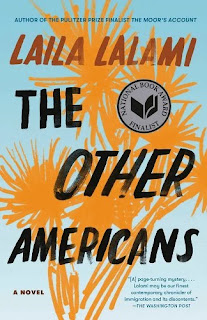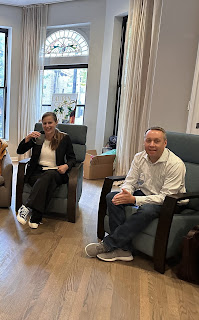Over drinks, our friend absolutely dished the dirt on "the real housewives of Roscoe Village." "You wouldn't believe the things I know," he told us, smirking. He named no names, but told tales of adultery, scandal, and much worse. Ensconced in our apparently naive and sheltered bubble, we were shocked at first. The next day, we couldn't help looking at the parents watching their kids in the park with a little more suspicion. But then as we thought more about it, none of this was that surprising, honestly. People with more money than good sense and who have experienced few consequences in their lives get up to a lot of "adventures." (I know that sounds judgmental.) It just hit differently that this wasn't some Netflix special or a romance novel. It was our neighbors!
Anyhow, all this was in the back of my mind as I devoured Lindsay Hunter's spicy new novel, Hot Springs Drive, about an affair between two neighbors in a leafy suburb. The affair leads to a murder, but not of either of the two parties involved in the affair! (not a spoiler, we know about the murder in the first few pages)
So we spend the first half of the novel getting to know these characters -- two completely normal suburban families. The two mothers become fast friends as they join a weight-loss club, complain about their ineffectual husbands, and prop each other up. But that doesn't stop one of the women from sleeping with the other's husband. Which is what leads to the murder.
Then in the second half, after the murderer is revealed, Hunter explores the effect of this trauma on the two families involved. How does each person process this trauma, and move on (or not)? How does it affect them long-term in future relationships?
Both of the men turn tail and run, and all but disappear from the story, which is fine. They're both standard-issue boring husband characters anyway (one is even a used car salesmen, almost putting too fine a point on it). The kids in both families scatter as well. While most of the characters are content to let the past stay the past, two of the characters, the daughter of the murdered woman and one of the sons next door, are as haunted by their deep first love as they are by the murder. Will a romance be rekindled?
If you've read Hunter before, you'll likely agree that this novel feels like a huge step forward for her -- a writer coming into her own. But if you haven't read Hunter before, this is a terrific introduction. It's a deceptively complex novel with a ton going on beneath the surface of the plot. There are hints of Oedipus, comments on our obsession with true crime, staunch feminism (it's Hunter published on Roxane Gay's new imprint, so this makes sense), motherhood, and the various ways we deal with trauma, both healthy and not. Hunter's writing here is sharp and sultry. This is a great read -- highly recommend this!






